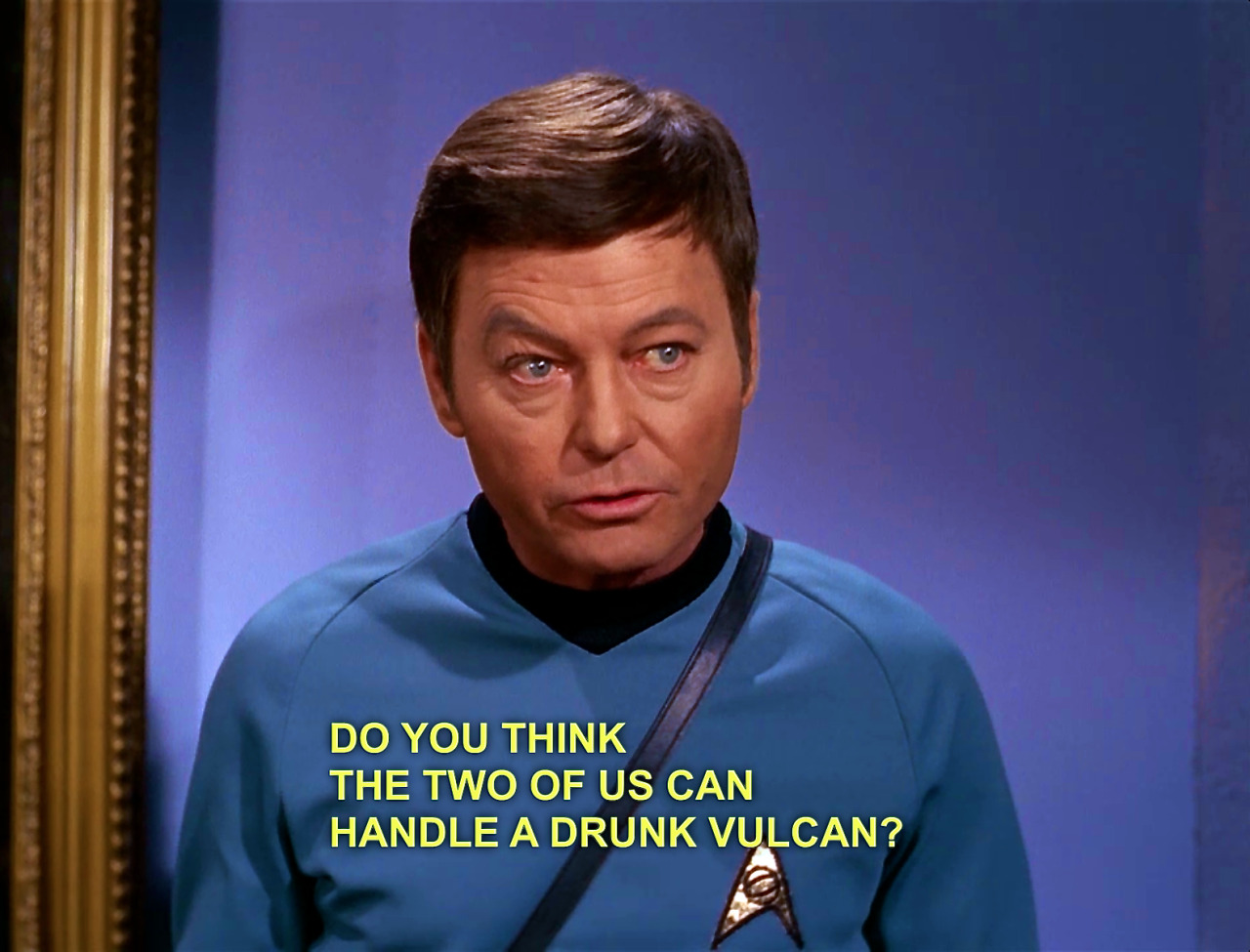Ale: It always read like we were kind of missing the joke. Part of that is that we don't have the context of knowing when it is "now." I get the impression that 2283 sounds surprisingly recent (if not current) and then McCoy makes it sound like this is the good stuff so it takes even longer (than bathtub gin?). By a couple of hours? Kirk's response of "oh?" is "Sure, Bones, why not?"
Ah, okay, that's sort of the impression I always had, but as a kid (and a lifelong teetotaler since) I was never clear enough on how alcoholic beverages work to be sure. Nice to get support for my impression at last.
If the last two digits had been below 60, I might've thought it was hours and minutes in military time. Although I've seen the occasional science fiction future where they count time decimally, by 100s instead of 60s.
As a fan of the Star Trek Maps and the fan works that followed that dating scheme, that was a GREAT day!
STM was actually a few years off from the now-accepted dating, putting TOS in 2261-63. There's also the strange case of David John Nielsen's U.S.S. Enterprise Heavy Cruiser Evolution Blueprints and Todd Guenther & aridas sofia's Ships of the Star Fleet Volume One, which both put ST:TMP in 2267 (more or less consistent with the STM dates) yet put The Search for Spock in 2287, as strange as that is. How can they be 20 years apart when TWOK was only 15 years after "Space Seed?"
But yes, most of the books at the time and the FASA role-playing game (chicken and egg) followed the Spaceflight Chronology dating. Which drove me nuts. If I follow up this project with a "The Final Reflection" book club I'm sure we'll get into that at length since that's a book that not only relies on that date scheme but the SFC specifically.
The main issue with the SFC dating is that "Metamorphosis" established that Cochrane was lost 150 years earlier at the age of 87, so if the episode had taken place in 2208 per the SFC, Cochrane would've had to be born in 1971. Which, okay, is not incompatible with "Space Seed" saying that sleeper ships were supplanted by faster drives in 2018, but it still seems unlikely that Gene Coon in 1967 intended him to be so close in time.
Also, "Where No Man" put the Valiant expedition 200 years before TOS, so that would've been absurdly early in the timeline, something like 2005 by the SFC scheme.
GR manages to analogize seeing the Enterprise to a nude scene. The man was a wizard.
There's a similar bit in the opening paragraphs of David Gerrold's "Encounter at Farpoint" novelization, describing Picard's reaction to seeing the Enterprise-D the first few times. It says that on his third viewing of the ship, "he saw it from a different angle" and recognized "the designer's private joke" that made the ship look "more feminine than most." I spent years wondering what Gerrold meant by that; my best guess is that he was saying that if you rotate the Galaxy-class deflector dish 90 degrees, it looks a bit like a vagina. If that's what he meant, it makes Roddenberry's classical allusion to Aphrodite tame by comparison. (My initial, tamer interpretation was that the dish looks a bit like a pair of feminine lips, but the "different angle" bit doesn't make sense that way.)
I have to wonder what was the tremendous advantage of launching eight hours early? What were they going to do that they were now not able to do?
They didn't know what they'd find, but the further it was from Earth when they intercepted it, the more time they'd have to figure something out.
How much time was lost after launch that might have been prevented in those eight hours? Or would everything that would go wrong after launch also have gone wrong if they had launched as scheduled so moving the launch up actually was critical?
Still, you're right about this part -- haste made waste, and they probably lost more time by rushing the launch and not getting everything sorted out. Still, the ship wasn't meant to launch for weeks yet, probably, so it could be that the systems would still have been unstable if they'd launched a few hours later.
The bigger improbability is that there's only one unready starship available to defend the heartworld of the entire Federation. True, the movie established that Earth had a defense grid that V'Ger was only able to bring down by stealing the access codes from the Enterprise computer, but there should've been an entire fleet of capital ships defending Sol System and the other heartworlds. The trope of the Enterprise being the only ship available to address a threat makes sense when it's out on the frontier, far removed from the Federation, but it's complete nonsense when the threat is to Earth itself.
Last edited:



